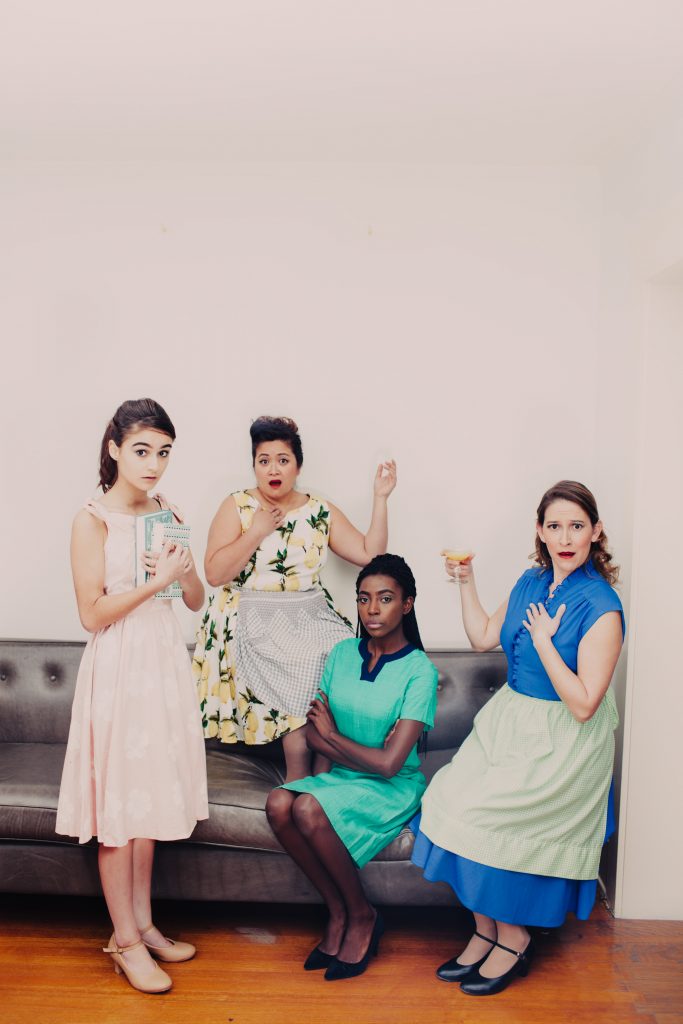Splintered text, history mar MOXIE’s fair ‘Bliss’
(Editor’s note: The introductory paragraphs of this review replace those in the original post of Feb. 6.)
At a whim, the god Apollo could buy and sell you. Tales of his power to heal and to reverse death are legion in Greek mythology; at the same time, woe betide the transgressors, especially as they reside among the humans.
The mortal Cassandra knew this well. She’d once turned out Apollo as he sought to up their ante, if you get the drift; his response was to grant her the gift of prophecy, after which she’d encounter universal disbelief in her predictions.

Cassandra (Alexandra Slade, third from left) is as cool as a cucumber, while Antonia, Maddy and Clementine (Taylor Linekin, Lydia Lea Real and Morgan Carberry) are anything but. Photo by Ash & Arrow Photography.
The bad doesn’t outweigh the good here, but it does enjoy a significant place on the scale, the era notwithstanding.
Post’s Etiquette: The Blue Book of Social Usage, published in 1945 and revised 19 times by 2017, is a centerpiece of our story — it’s all the rage between Stepford wives Maddy and Clementine and teen friend Antonia in the North Orange, N.J. of 1960, who slavishly take it as gospel on social acceptability in all situations. Not to worry if their faith in the book fails; “emerald angels” and a glass of water do wonders in restoring it, to the extent that pill-popping is a cottage industry in their white-bread neck of the woods.
Fair-weather patriotism, interracial dating and the outlook for a steamy affair snake their way into the mix as black office girl Cassandra unsmilingly sets up shop, counterpart to her own ancient Greek legend. She’ll leap through time as the Cass of yore, endowed with the ability to see the future yet derided as a liar amid her refusal of the god Apollo’s sexual advances.
There’s only one way to break Apollo’s curse, and that’s to persuade someone to believe her forecasts. In so doing, she’ll fuel the transcendence of her new friends (the Medea, Clytemnestra and Antigone of centuries gone by) and halt the male encroachment onto the modern woman’s trajectory.

Emily Post was the maven of social acceptability until her death in 1960 at age 86. Public image.
The muddles occur when Brandli loses a certain control over her grasp of language. Antonia’s reciting a plot point one minute; she’s anecdoting it the next, just in time for Maddy and Clementine to do the reverse. The story consequently drifts between showing and telling — certainly not a mortal sin, but prominent enough to note.
There’s an almost built-in fix for part of that problem. Given Cassandra’s and Apollo’s places in time and space, their encounters demand mythic — MYTHIC! — speeches and acting styles, eons removed from North Orange’s clapboard facades. Not only is a shift in the flavor of the dialogue called for; a wholesale reconfiguration of the characters’ places onstage would enliven things accordingly.
As it is, Apollo and Cassandra are probably never more than six feet from one another — not a terribly godly distance, considering.
MOXIE co-founder and former artistic director Delicia Turner Sonnenberg helms some decent coaching, notably with the very good Lydia Lea Real as the frantic, never-let-’em-see-ya-sweat Maddy. Compare that with Morgan Carberry’s caustic, sour Clementine, Taylor Linekin’s sheltered Antonia and Alexandra Slade’s poker-faced Cassandra, and the motley mix needs only Steve Froehlich’s hunky Apollo to complete the cohesive, busy unit.

Playwright Jami Brandli broaches the exigencies of modern womanhood, the peripheries for which she suggests have lasted thousands of years.
Victoria Petrovich’s set is loaded from stem to stern with rooms from each woman’s house — they’ve got an almost neon glow thanks to lighting designer Christina J. Martin, but Antonia’s room could almost be a suggestion of a space, thus freeing much more stage for Apollo and Cassandra. And dig costumer Shelly Williams’ garb on Maddy! Those crazy patterns define the character all by themselves.
Post left us at age 86 in 1960, the same year in which the play is set, so she really was dead after all. Her family handles her legacy today, the same as Brandli manipulates a mirror of it with her play about the exigencies of modern womanhood. The latter has its qualities amid its imaginative ideation — but while Post won’t roll over in her grave about its deficiencies, she might have a problem getting back to sleep.
Martin Jones Westlin’s e-mail address is [email protected].
This review is based on the opening-night performance of Feb. 3. Bliss (or Emily Post Is Dead!) runs through Feb. 25 at MOXIE Theatre, 6663 El Cajon Blvd. in the Rolando area. $33-$36. 858-598-7620, moxietheatre.com.
